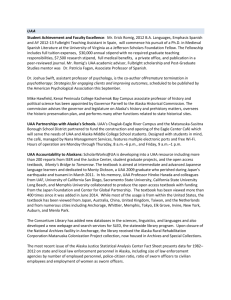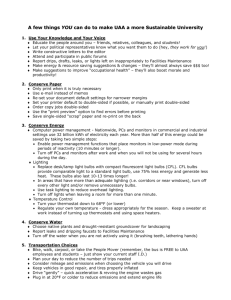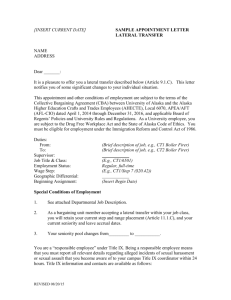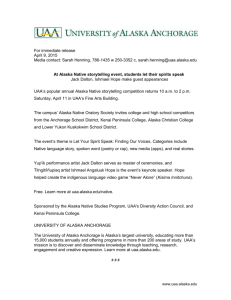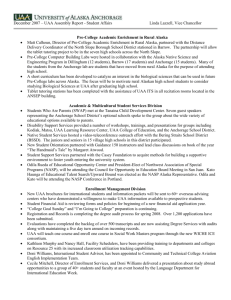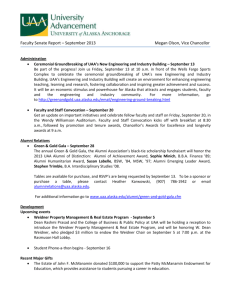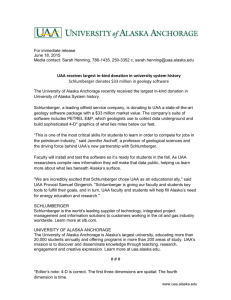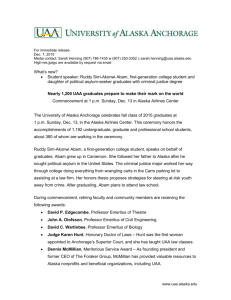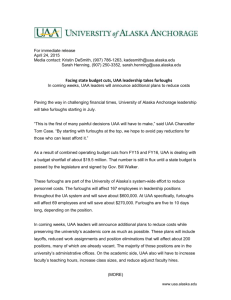University of Alaska Anchorage College of Education 3211
advertisement
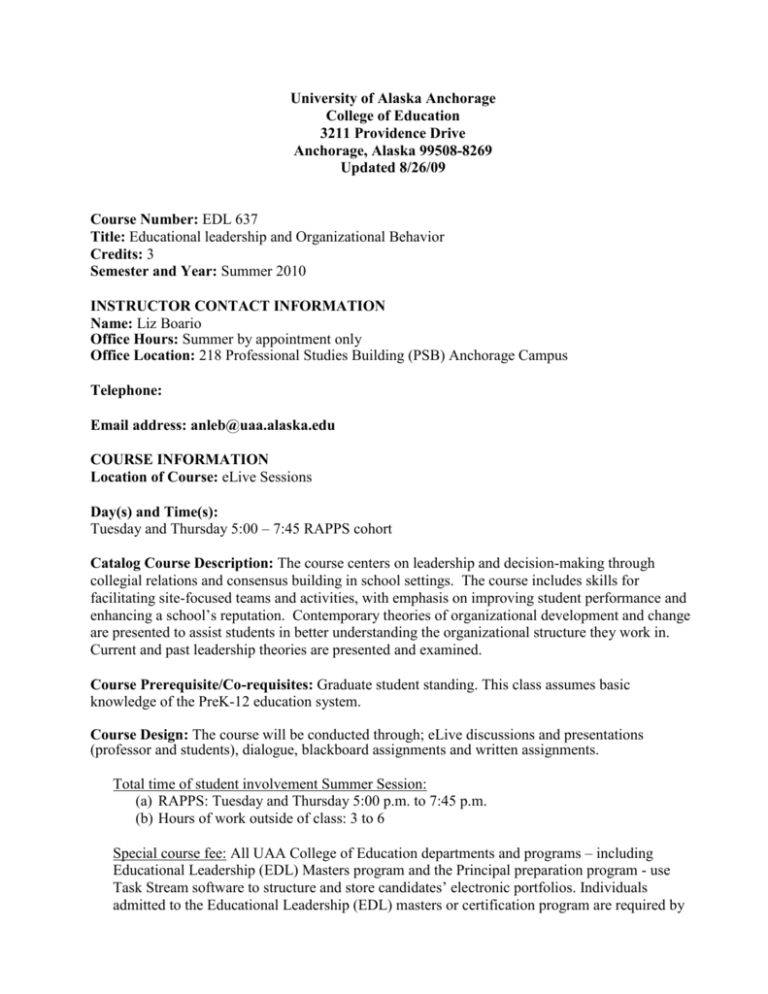
University of Alaska Anchorage College of Education 3211 Providence Drive Anchorage, Alaska 99508-8269 Updated 8/26/09 Course Number: EDL 637 Title: Educational leadership and Organizational Behavior Credits: 3 Semester and Year: Summer 2010 INSTRUCTOR CONTACT INFORMATION Name: Liz Boario Office Hours: Summer by appointment only Office Location: 218 Professional Studies Building (PSB) Anchorage Campus Telephone: Email address: anleb@uaa.alaska.edu COURSE INFORMATION Location of Course: eLive Sessions Day(s) and Time(s): Tuesday and Thursday 5:00 – 7:45 RAPPS cohort Catalog Course Description: The course centers on leadership and decision-making through collegial relations and consensus building in school settings. The course includes skills for facilitating site-focused teams and activities, with emphasis on improving student performance and enhancing a school’s reputation. Contemporary theories of organizational development and change are presented to assist students in better understanding the organizational structure they work in. Current and past leadership theories are presented and examined. Course Prerequisite/Co-requisites: Graduate student standing. This class assumes basic knowledge of the PreK-12 education system. Course Design: The course will be conducted through; eLive discussions and presentations (professor and students), dialogue, blackboard assignments and written assignments. Total time of student involvement Summer Session: (a) RAPPS: Tuesday and Thursday 5:00 p.m. to 7:45 p.m. (b) Hours of work outside of class: 3 to 6 Special course fee: All UAA College of Education departments and programs – including Educational Leadership (EDL) Masters program and the Principal preparation program - use Task Stream software to structure and store candidates’ electronic portfolios. Individuals admitted to the Educational Leadership (EDL) masters or certification program are required by the College of Education to obtain and maintain a COE / EDL Task Stream account and portfolio as part of their College and program requirement and depository of core assignment records or documentation. Certificate and/or degree information: This course is required course for the statewide principal certification and Masters in Educational Leadership Program. Course delivery method(s) used: e-Live Course Design Premises: The quality of relationship deeply influences the quality of thinking. People must take action to learn. Learning often means deliberately stepping outside our comfort zone. Learning must be connected to what you care about. Learning requires engaging the full person – emotions, body & quality of mind COLLEGE OF EDUCATION CONCEPTUAL FRAMEWORK Mission Statement: The mission of the College of Education is to prepare educators and support the lifelong learning of professionals to embrace diversity and to be intellectually and ethically strong, resilient, and passionate in their work with Alaska's learners, families, educators, and communities. Our programs emphasize the power of learning to transform people's lives. Across the university, faculty members teach professional educators to work in diverse settings, to form and sustain learning partnerships, and to provide learning across the life span. We are confident that this preparation will result in educators' significant contributions to society. Core Values: The College of Education promotes the following core values: Intellectual Vitality; Collaborative Spirit; Inclusiveness and Equity; and Leadership. Commitment to Diversity: Students enrolled in this course will develop (a) realizing personal and professional growth through self-evaluation and reflection; (b) examining personal beliefs toward people from different ethnic and socioeconomic communities and genders; (c) demonstrating sensitivity toward people from diverse racial, ethnic, and cultural backgrounds; (d) appreciating cultural diversity and its applications to teaching (leading) multicultural populations. Commitment to Technology: College of Education students are expected to (a) demonstrate sound understanding of technology operations and concepts; (b) plan and design effective learning environments and experiences supported by technology (c) use technology to enhance productivity and professional practice. TaskStream: TaskStream is a comprehensive web-based resource and storage system for students to collect, store and post work that will form the basis for an electronic portfolio, which is an exit requirement for most College of Education programs. TaskStream has other tools and resources that may be helpful to students. One example is the comprehensive Standards Bank which includes national standards from specialized professional associations, like ELCC, which are used for EDL programs.. Students are responsible for purchasing a subscription to TaskStream just as students are responsible for purchasing books. Effective fall semester, 2009, all EDL courses will begin to use TaskStream. Subscriptions to TaskStream can be purchased by students directly from TaskStream. As of August, 2009 the subscription rates directly from TaskStream are: 1 semester $25 (one semester is 5 months) 1 year $42 (365 days from the date of purchase) 2 years $69 (730 days from the date of purchase) To subscribe online, go to www.taskstream.com, click on “subscribe” (across the top). Then choose “Create a new TaskStream subscription” and follow the instructions using a credit card to make the purchase. Please make a note of the username and password! Instructional Goals and Student Outcomes Alignment with Assessment Measures, Standards, and Core Values: Instructional Goal 1.0: The student will assess his/her strengths and weaknesses for assuming a contemporary leadership role. Core Value addressed: Leadership, Intellectual Vitality Student Outcomes Assessment Measures 1.1 The student will use the Completion of self 21st Century Skills assessment Assessment of personal instructional leadership strengths and weaknesses These skills are needed for assuming a contemporary leadership role. Student Outcomes Assessment Measures TaskStream Assignment No Standards Alaska Administrative Standards 1-10 NCATE Standards 1-6 TaskStream Assignment Standards 1.2 The student will Written 2-3 page paper analyze two of their areas No of strength and two areas of weakness as determined by the 21st Century Skills Assessment. Determine what a professional development plan for the weak areas might look like. Instructional Goal 2.0: The student will be able to describe and apply exemplary and effective leadership characteristics and practices. Core Value addressed: Leadership, Intellectual Vitality, Collaborative Spirit, Inclusiveness and Equity Student Outcomes Assessment Measures 2.1 The student will apply and analyze the tenets outlined in Leadership Challenge to analyze leadership and apply it to personal situations. TaskStream Assignment No Standards Alaska Administrative Standards 1, 5, 6, 7, 8, 9, and 10 NCATE Standards 1, 4, 5, and 6 Instructional Goal 3.0: Candidate will know and understand the Leadership Skills need for the 21st Century. Core Value addressed: Leadership, Intellectual Vitality, Collaborative Spirit, Inclusiveness and Equity Student Outcomes Assessment Measures 3.1 Apply interpersonal skills and group processes tools for facilitating development of a school mission and vision Develop a vision statement TaskStream Assignment No Standards Alaska Administrative Standards 1-10 NCATE Standards 1-6 Instructional Goal 4.0: The student will synthesize issues, skills, and theories related to organizational change, decision making, and leadership. Core Value addressed: Leadership, Intellectual Vitality, Collaborative Spirit, Inclusiveness and Equity Student Outcomes 4.1 The student will analyze leadership scenarios to identify relevant theories and to propose related courses of action. Assessment Measures TaskStream Assignment No Standards Cultural Lens Alaska Administrative Standards 1-10 Patterns NCATE Standards 1-6 Course Texts, Readings, Handouts, and Library Reserve: Required Texts: Kohm, B., Nance, B. (2007). Principals who learn: Asking the right questions, seeking the best solutions. Alexandria, Va: ASCD. Kouzes, P, Posner, B. (2007). Leadership Challenge. (4th ed.) San Francisco: Josey-Bass. Wheatley, M. (2006). Leadership and the new science: Learning about organizations from an orderly universe. San Francisco: Berrett-Kohler COURSE POLICIES Writing Style Requirements: All assignments must be typed. Assignments will be sent electronically submitted to BB gradebook. Course assignments should reflect graduate level expectations in terms of scope, depth, expression, technical accuracy, originality, and appearance. In addition, all course work must conform to the guidelines of the American Psychological Association (APA), where appropriate. The following website has information regarding a basic bibliography http://www.psywww.com/resource/apacrib.htm Use APA guidelines (5th edition) for all professional papers. For assistance, refer to http://www.apa.org/ or http://owl.english.purdue.edu/owl/resource/560/01/ Attendance, Late Work, and Make-up Policy: Class attendance is compulsory. If emergencies please contact me via e-mail, anleb@uaa.alaska.edu. Students are expected to attend, be well-prepared and participate actively during the Elive and other sessions. They are also expected to contribute interesting and well thought out comments on the discussion page of Blackboard. Grading System: Students must complete all requirements to achieve a passing grade. This includes attendance at all class sessions, effective contribution in class and on the discussion board, and satisfactory completion of formative and summative assignments. A= B= C= D= F= 90 - 100% 80 - 89% 70 - 79% 60 - 69% <60% Students are reminded that the grades A, B and C are all passing grades. While the Master of Education has a requirement for students to achieve at a grade level of B or higher, the grade of C is not a failing grade. While no normal curve of distribution is used for grading, it is quite likely that some students will perform at a much higher level than others and that there will be a spread of scores. Students have three opportunities to perform at the appropriate level to demonstrate competence, knowledge and mastery: (1) when they first submit their assignments, (2) in some cases, and at the discretion of the instructor, when they are given an opportunity to ‘make-up’ a failing assignment, and (3) at the end of the course when an Incomplete grade might be given. (Incomplete Course work not completed within two weeks of the semesters end will be lowered one letter grade.) Code of Ethics: (For on-line discussions and group work) Confidentiality -- The discussions, and all other communications within the course are confidential to the class members. What’s said in class stays in class. Listening -- Students are expected to listen carefully to sessions in Blackboard and E-live. For asynchronous participation, “listening” will require care reading of other students’ postings or listening to a recorded short lecture or interview. Encouraging -- Just as the instructor encourages each student to have a voice in class discussions students are expected to encourage each other to use his/her voice. With encouragement established as a class norm, students can feel safe to share opinions, experiences, and failures. Accepting -- Students are expected to model acceptance of others and others’ viewpoints in the on-line and face-to-face class meetings. Students are expected to use bias-free language in discussions and written postings. Respecting -- Respect is another inherent part of the culturally responsive learning environment. Students are expected to respect differences in local districts, as well as individuals. Religious Holiday or Cultural Observance: If a class meeting occurs on a religious holiday or cultural observance day and you are obligated to miss class for this event, you must notify the instructor in writing by the end of the second week of the semester. COURSE CALENDAR/SCHEDULE IS POSTED UNDER ASSIGNMENTS IN BLACKBOARD. COURSE GRADED ASSIGNMENTS - MORE DETAIL IN BLACKBOARD LEADERSHIP SKILLS PAPER - 15 WHEATLEY PATTERNS PAPER -15 VISION POWER POINT -25 CULTURAL LENS PRESENTATION -20 PRINCIPALS WHO LEARN CHAPTER PRESENTATION (GROUP ASSIGNMENT) - 10 PARTICIPATION -15 UNIVERSITY POLICIES: Academic Integrity Academic integrity is a basic principle that requires that students only take credit for ideas and efforts that are their own. Cheating, plagiarism, and other forms of academic dishonesty are defined as the submission of materials in assignments, examinations, or other academic work that is based on sources prohibited by the faculty member. Substantial portions of academic work that a student has submitted for a course may not be resubmitted for credit in another course without the knowledge and advance permission of the instructor. For more information, refer to the UAA Fact Finder/Student Handbook at http://www.uaa.alaska.edu/studentaffairs/factfinder.cfm. Advice on avoiding plagiarism may be obtained at http://owl.english.purdue.edu/owl/resource/589/01/ Communications Via E-mail UAA uses e-mail to communicate with students on many important matters. The University automatically assigns each student an official UAA e-mail account at the time of admission to the University for certificate/degree seeking students and at the time of registration for all other students. Students are responsible for knowing and, when appropriate, acting on the contents of all university communications sent to their official UAA e-mail accounts. To receive university communication at a different e-mail address, students may forward e-mail from their assigned UAA accounts to any valid third party e-mail address of their choice that accepts forwarded e-mail. (Some e-mail service providers filter out forwarded e-mail. Students should check with their service providers to ensure that forwarded e-mails are accepted.) If forwarded e-mail is accepted by your service provider, go to UAA's Identity Manager (http://username.uaa.alaska.edu), log in and set your forwarding e-mail address under the "Change Other Account Attributes" link. Contact the UAA IT Callcenter by telephone at (907) 786-4646 or Toll Free (877) 633-3888 or by e-mail at callcenter@uaa.alaska.edu if you need assistance. Disability Support Services Disability Support Services (DSS) is responsible for coordinating support services for UAA students who experience disabilities. To access support services, students must contact DSS and provide current disability documentation that supports the requested services. Additional information may be accessed at the DSS Office in Rasmuson Hall (RH105) or on-line at www.uaa.alaska.edu/dss. Incomplete Grades: In accordance with University policy, an incomplete grade (I) is assigned only at the discretion of the instructor. It is used to indicate that a student has made satisfactory progress in the majority of the work in a course, but for unavoidable absences or other conditions beyond the control of the student, has not been able to complete the course. For more information, refer to Chapter 7 Academic Standards and Regulations in the UAA catalog. Safety on Campus: Safety is a priority at UAA. All members of the academic community are encouraged to take responsibility for their own safety by taking the time to locate the nearest exits and emergency telephones when they are in campus buildings. Safety concerns may be brought to the attention of UAA faculty or staff, or the University Police at (907) 786-1120 (V/TTY). For more safety information and the most recent campus crime report, visit www.uaa.alaska.edu/safety. Safety in Online Environments UAA will never send you an unsolicited e-mail asking you for your password or other personal information. If you receive such a message, please delete it. If you have any concerns, contact the IT Call Center at (907) 786-4646, menu option 1, or via email at callcenter@uaa.alaska.edu. If you experience cyberbullying, cyberstalking, or other inappropriate conduct as part of your involvement in a UAA class, please notify your instructor immediately. Student Code of Conduct As with all members of the University community, the University requires students to conduct themselves honestly and responsibly, and to respect the rights of others. Conduct that unreasonably interferes with the learning environment or that violates the rights of others is prohibited by the standards and guidelines collectively described as the Student Code of Conduct. For more information, refer to the UAA Fact Finder/Student Handbook at http://www.uaa.alaska.edu/studentaffairs/fact-finder.cfm. COLLEGE OF EDUCATION POLICIES: Criminal History Background Clearance The College of Education requires compliance with specific background clearance policies and procedures for candidates participating in university-sponsored fieldwork. There are two types of background clearances required. In general, Alaska Public Safety Information Network (APSIN) clearance is required for lecture courses that include a fieldwork component as part of the course. Courses that are primarily field-based, such as practica or internships, require fingerprinting and a national (FBI) criminal history background check. Various agencies and centers may have additional requirements. In some cases, criminal history background clearance is required for admission to a department or program. Failure to comply with the College of Education background check requirements will result in denial of access to field placement settings. Failure to pass the criminal history background check will result in removal from the program. More information is located at http://coe.uaa.alaska.edu/background.cfm. Professional and Ethical Behavior College of Education students are expected to abide by the State of Alaska Code of Ethics of the Education Profession and professional teaching standards as they concern students, the public, and the profession. The standards, adopted by the Professional Teaching Practices Commission (PTPC), govern all members of the teaching profession. A violation of the code of ethics and professional teaching standards is grounds for discipline by PTPC. For more information, refer to http://www.eed.state.ak.us/ptpc/. In addition to the Alaska Code of Ethics of the Education Profession, national professional organizations may have additional expectations for professional and ethical behavior related to the specific profession.
